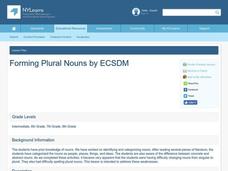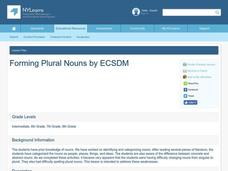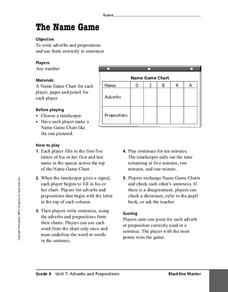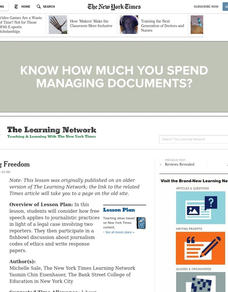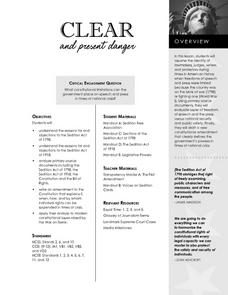Curated OER
Creatively Creating Expository Essays
Students, after reading Fahrenheit 451, brainstorm inventions that could have been in the novel. They present their invention to the class and writing an expository essay about their creation.
Film English
Moments
Examine homelessness through a series of writing and discussion activities and a short film. Learners first come up with their own stories based on images of characters in the film. They then watch the film and respond to a series of...
Curated OER
Communication and Social Networks
Pupils work in cooperative groups to explore communication needs of our world. They are assigned a demographic area and asked to create ways to solve communication problems with innovative ideas. They also explore areas that can help...
K12 Reader
Adverbs of Frequency II
Describe your daily activities with adverbs of frequency. Kids recall which things they seldom do, they rarely do, they frequently do, and the things that they never do.
Curated OER
Forming Plural Nouns
Everyone knows that a noun is a person, place, thing, or idea - but what happens when you have people, places, things, or ideas? Use this SMART board activity to guide your class through plural nouns. Several activities, including making...
Curated OER
Forming Plural Nouns
Interactive SMART Board activities provide young grammarians with practice changing singular nouns to plural nouns. Learners then create collages on which they inscribe the singular and plural form of the noun label.
Curated OER
Coming Home:From the Life of Langston Hughes
Third graders listen to the non-fiction book: COMING HOME: FROM THE LIFE OF LANGSTON HUGHES. They identify examples of metaphors and similies within the book and understand how this figure of speech is used in writing. They then create...
Curated OER
Ideas for Classroom Election Activities
This handout provides suggestion8s for exploring the elections process including making a party platform poster, writing a speech in the style of a famous politician, having a debate, planning a convention, and more! While some of the...
Curated OER
Eloquent Speech
Second graders discover that oral and written communication can be improved, and made to sound more eloquent, when the following questions are addressed; Who? What? Where? When? Why? students use word processing to copy a poem using clip...
Curated OER
Researching Skills: Taking Notes
The how and why of note taking is the focus of a four-page worksheet. Tips include how to take notes in class, how to prepare note cards for a speech, how to fill out note cards on readings, and where to keep notes. Whether distributed...
Curated OER
Speech Therapy Students Interact Between Schools
Students use technology to improve their communication skills and have the ability to interact with other speech students attending other elementary schools. Through riddles, games, and other activities, students attain their speech...
Curated OER
Into To Adverbs
Students explore the function of adverbs. While taking notes during the class lecture, students explore the parts of speech and label the adverbs. They identify the types of questions that adverbs answer and explore the difference...
Curated OER
Getway to More Descriptive Writing
Learners use more precise descriptive words in their writing.
Curated OER
Writing About the Zoo Trip
Second graders practice writing. In this five senses writing lesson, 2nd graders describe their experience on the field trip they took to the zoo. They work as a class and independently to come up with different things they saw, smelled,...
Curated OER
Writing Applications
Tenth graders read the novel Great Expectations by Charles Dickens and complete characterization activities. In this characterization lesson plan, 10th graders work in tiers to examine the text for evidence about the way Dickens uses the...
Curated OER
ESL Simple Past Tense of the Verb To Be- Fill-In-The-Blank Worksheet
For this ESL simple past of the verb, to be, worksheet, students look at 8 small clip art pictures. They write a sentence that describes the picture using the simple past of the verb to be.
Curated OER
The Name Game
In this grammar worksheet, students write acrostic poems using the first 5 letters of their first and last names and provide adverbs and propositions for each letter. Then they write sentences for each word.
Curated OER
ESL How Much or How Many?- Fill in the Blank
In this ESL how much or how many fill-in-the-blank worksheet, students examine small clip art pictures before answering 8 "how much" or "how many" questions.
Curated OER
Idioms
It's often confusing which word should be used to complete a sentence. Although this learning exercise's title insinuates that idioms will be discussed, the practice section is just about using words like to, who, with, as, and that...
Curated OER
Listening To A Guest Speaker
Students participate in a lesson of listening to a guest speaker. They pay attention to the information and are active in taking notes, generating follow up questions, and summarizing the presentation. Students practice clear speaking...
Curated OER
Language Arts: Writing Diamante Poems
Third graders discover how to write diamante poems and review the parts of speech contained in them. After writing poems about their teacher, they create ones about themselves. The poems, assessed for creativity and handwriting, are then...
Curated OER
Student Mad Libs
Young scholars investigate the different parts of speech by participating in a fill in the blank activity. In this Mad Libs lesson, students define the different parts of speech and discuss how they are used appropriately in sentences....
Curated OER
Press-ing Freedom
Students consider how free speech applies to journalistic practices in light of a legal case involving two reporters. They participate in a fishbowl discussion about journalism codes of ethics and write response papers.
Curated OER
Clear and Present Danger
Students assume identities of lawmakers, judges, writers, and protestors during times in American history when freedoms of speech and press were limited because country was on the brink of war or fighting one. Students use primary source...




